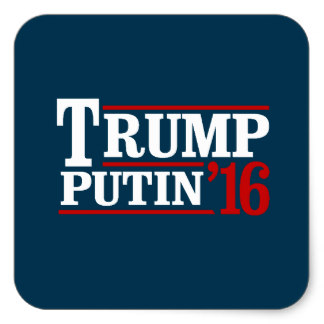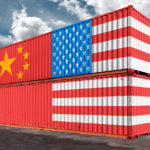This is part 1 of 2 in an examination of shifting US-Russia relations and that shift’s impact on the world…

Image via Zazzle.com
In recent weeks, the mainstream media has worked itself up on the matter of President Trump and his personal and campaign ties to Russian officials. Now this isn’t exactly new news, the subject of the Trump campaign’s ties to Russians has been known since former campaign manager Paul Manafort was paid over $12 million for consulting work by the now deposed pro-Kremlin Ukrainian president Viktor Yanukovych. [1] [2] There is also Trump’s public praise of Vladimir Putin on Twitter, Trump eliminating anti-Russia policies from the Republican national platform, and Putin and Russian State media’s continued praise of the new President. Even more recently, unvetted memos, often referred to as the Trump Dossier [3], which were compiled by a private British intelligence agent working as an opposition researcher for various anti-Trump campaigns, had been floating around Washington intelligence and political circles for some time. [4] Though unverified and vehemently denied by Trump, salacious accusations found in these memos involving prostitutes and their activities have captured the public discourse. More concerning are the other allegations made in the Dossier. They allege collusion between Kremlin and Trump Campaign agents. Those accusations, along with the five confirmed calls between the Russian ambassador to the US, Sergei Kislyak, and Trump-appointed National Security Agency Chief Michael Fllynn on the day President Obama announced more sanctions on Russia, have US allies panicked. [5] Some of the US’ closest allies, such as Israel, have reportedly been advised by US intelligence agents against sharing intelligence with the Trump administration as they fear it might get into the hands of Kremlin agents [6] and passed along to Iranian agents. While your reaction to these accusations and connections may vary, they do exist, and President Trump does express a desire to shift US tradition and bring about closer relations between Russia and the US.
While Trump’s connections to Russia raise debate, he is most likely, as ex-CIA chief Mike Morrell put, “an unwitting asset of the Kremlin” in the sense that a friendlier and more enabling relationship between Russia and the US aids the Russian agenda. In my next piece on this topic, I will cover why Kremlin’s interests and Trump’s foreign policies overlap and the gains Russia hopes influencing the US elections might have. However unwitting or not, President Trump’s statements on US foreign policy have given the Kremlin an opportunity to advance Russian interests like never before. Since the end of WWII, the United States has worked with its allies in Western Europe and across the globe to temper Soviet influence. The election of Donald Trump, and his less than warm words for the institutions built to maintain peace in Europe like NATO and the European Union, present a sharp break in that US foreign policy and that has America’s traditional allies worried and its rivals emboldened. The political vendetta behind this is between the forces of stability and change; should the United States maintain the current status quo of its current system of alliances, or should it embark on a new course that seeks closer ties to Russia and a step back from leadership in organizations like NATO, the UN, or EU?
Continuing current US foreign policy with regards to Russia carries the same risks and rewards that it has always carried. As a leader in the worldwide, diplomatic institutions set up in the wake of WWII, the United States and the NATO members pledged to come to the military defense of any NATO member threatened. Current US policy is also firmly committed to the success of the European Union, whose aim is to tie the economies of Europe so closely together that the European powers can’t afford to go to war with each other and in the process create a shared European identity. Moreover, the uniform regulations, common currency, and free market across the EU make trading with the 28 (soon to be 27 with the British exit) countries of the European Union much easier and cheaper. But it’s not all sunshine and roses, the treaty obligations involved with NATO membership require the US to be prepared to go to the defense of even the smallest NATO member states like Latvia, Lithuania, and Estonia – all former Soviet Republics with Russian minorities that Vladmir Putin would love to put back into the Russian orbit. If Putin were to do to one of the Baltic states what he did in Ukraine, it could trigger war with Russia between NATO and Russia. If the United States decided not to fulfil its obligations under NATO, it would essentially mark the end of the world’s largest military defense alliance. This is why in his last days in office President Obama approved the early deployment of US troops to bases in Norway, Romania, Bulgaria, Poland, ostensibly to make it harder for a Trump administration to quietly tamp down on US entanglement in NATO.[7]
On the other hand, President Trump’s statements that the US “wouldn’t care” if the European Union dissolved and that NATO is obsolete were a welcome gift to Kremlin officials who have long recognized the two organizations and roadblocks to reconstituting Russia’s greatness. By remaining ambivalent, at best, towards the EU and NATO, Donald Trump has bolstered parties who want to dissolve the EU and he has many of Europe’s foreign ministers panicking. [8] Now, this could be undue panic, perhaps all Trump sees in Putin is a potential ally against ISIS, as recently discussed between the meeting between President Trump and Putin. Although a new Russian alliance may save the US from major troop depoyments in the Middle East and provide a key ally in defeating ISIS, giving the cold shoulder to our allies in Western Europe could provoke more countries to leave the EU returning Europe to the balance of power and systems of alliances that resulted in two cataclysmic world wars. On this side of the Atlantic, a neutered NATO and EU would leave the US incapable of heading off Russian expansionism into Eastern Europe and, on the economic front, force US companies to have to deal with 27 regulatory systems in order to trade on a continent where they only had to deal with one before.
So where does this leave us? Are we powerless to sit here as the man who spent his campaign blasting NATO, western intelligence agencies, and challenging norms at the heart of American democracy assumes power? Will the executive branch’s nearly complete authority on foreign policy mean that President Trump ,who may or may not be vulnerable to Russian blackmail and whose nominee for Secretary of State, Rex Tillerson, has been given awards of friendship by the Kremlin, will begin the process of breaking up the Western Alliance? After all, the Western Alliance is in large part full of duties and obligations of the US that don’t grant a direct benefit to the US, something that goes counter to the tenor of the America First platform. With allies panicking in Europe and elsewhere, Trump’s inauguration itself may have already begun those moves.
Fortunately, all is not lost. As we learned from the flood of calls to Congress that prevented House Republicans from gutting the House Ethics Office, a similar flood to Congress can help mitigate the effects of having “an unwitting asset of the Kremlin” destroy the geopolitical backdrop the US has carefully laid in place (the same backdrop that has helped create the Western standard of living). Now, nothing can be done about Trump’s presidency. He was legally elected, despite apparent Russian aid, and will be president for at least the next 4 years. However, we can mitigate the damage this does by ensuring the people who surround him and are accountable to us have American interests at heart and not Kremlin or other private interests. It is time for all of us to call our senators and representatives and demand they take back Congressional authority on foreign policy. Blunting Russian influence has been a bipartisan stance since 1945 via means of containment and the use of multilateral institutions like NATO and the EU to present a bulwark against Russian expansion in Europe. Though the President’s power over foreign policy has been consolidated over time, we have always understood that allowing Russia to dominate half the world runs counter to American interests. In fact, the consolidation of presidential power has largely been to more effectively counter Russia; now that we have a Kremlin asset in the White House, it is important that Congress reassert its authority through its appropriation power, power to declare/refuse to declare war, and pass sanctions bills, to temper Trump’s affinity for Russia. Contact your senators. The stability of the world depends on it.
Capitol Switchboard: (202) 224-3121
Find the phone number to your Senator and representative’s local offices at: https://callyourrep.co/
FOOTNOTES AND REFERENCES:
- https://www.nytimes.com/2016/08/01/us/paul-manafort-ukraine-donald-trump.html?_r=0
- https://www.nytimes.com/2016/08/15/us/politics/paul-manafort-ukraine-donald-trump.html
- https://www.documentcloud.org/documents/3259984-Trump-Intelligence-Allegations.html
- http://www.nytimes.com/interactive/2016/08/29/us/politics/document-Reid-Letter-to-Comey.html
- http://www.npr.org/2017/01/14/509814825/gen-michael-flynn-spoke-to-russian-ambassador-same-day-sanctions-were-announced
- http://www.ynetnews.com/articles/0,7340,L-4906642,00.html
- https://www.nytimes.com/2017/01/16/world/europe/norway-us-russia-marines.html
- http://www.politico.eu/article/donald-trump-leaves-europe-in-the-cold-in-inauguration/



